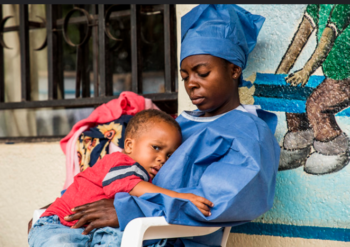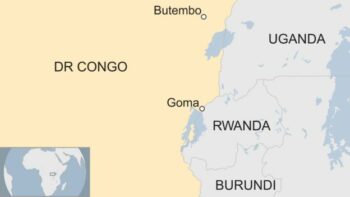By Mark Ellis –

The first case of deadly Ebola arrived in Goma, DR Congo, via a pastor that had preached in seven churches in rural Butembo in early July.
In the course of his ministry activities, the unidentified pastor had physical contact with ill worshippers and first experienced symptoms of fever on July 9th, according to DR Congo’s Health Ministry.
Six days later he took a bus to Goma, 124 miles to the south. He may have tried to hide his symptoms and identity at several checkpoints, the Ministry stated.
 He checked himself into a clinic in Goma on July 14th and tested positive for Ebola a few hours later. Health officials sent him back to Butembo to be treated the next day, but he died during the return trip.
He checked himself into a clinic in Goma on July 14th and tested positive for Ebola a few hours later. Health officials sent him back to Butembo to be treated the next day, but he died during the return trip.
WHO emergencies chief Mike Ryan told Reuters they identified 60 people who had contact with the infected pastor, including 18 who were on the bus with him. Half of his contacts have received an experimental Merck vaccine.
Since then, three others in Goma have contracted the disease, a man who had traveled through an area affected by the epidemic, along with his wife and one-year-old daughter.
“We’re seeing the first active transmission chain in Goma and expect more to come,” said Andre Heller, the International Rescue Committee’s Ebola response director.
Densely populated Goma sits on the border with Rwanda, which raises fears the hemorrhagic fever could travel across the Rwanda border.
“The case in Goma could potentially be a gamechanger in this epidemic,” WHO Director-General Tedros Adhanom Ghebreyesus told Reuters. “It is a gateway to the region and the world.”
The disease is transmitted through bodily fluids and at the beginning stage may resemble flu symptoms, but it soon morphs into severe bleeding and organ failure.
Following a 2014 outbreak, Ebola killed 11,000 people across several countries in West Africa over the course of 24 months.
So far, this outbreak has infected 2,500 people and killed 1,655 in the farmlands of eastern DR Congo. A mix of armed militias and a mistrust of health officials have complicated efforts to halt the virus in affected areas.
After news hit about the case in Goma, Rwanda briefly closed its border and advised against travel to the area. Last month, Saudi Arabia stopped issuing visas to Muslims from the Congo for the annual hajj pilgrimage because of the outbreak.
Jean-Jacques Muyembe, Congo’s new Ebola response coordinator, warned about half of the cases are going undetected, adding, “This epidemic could last two or three years.”



